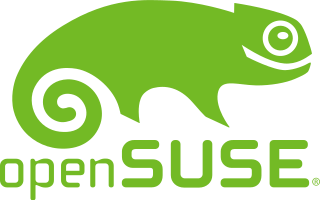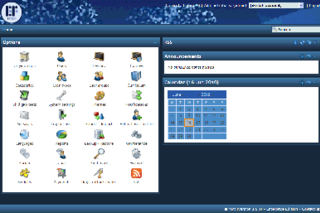
AIX is a series of proprietary Unix operating systems developed and sold by IBM for several of its computer platforms.

GNU Image Manipulation Program, commonly known by its acronym GIMP, is a free and open-source raster graphics editor used for image manipulation (retouching) and image editing, free-form drawing, transcoding between different image file formats, and more specialized tasks. It is extensible by means of plugins, and scriptable. It is not designed to be used for drawing, though some artists and creators have used it in this way.
Concurrent Versions System is a version control system originally developed by Dick Grune in July 1986.

Apache Subversion is a software versioning and revision control system distributed as open source under the Apache License. Software developers use Subversion to maintain current and historical versions of files such as source code, web pages, and documentation. Its goal is to be a mostly compatible successor to the widely used Concurrent Versions System (CVS).
Moodle is a free and open-source learning management system written in PHP and distributed under the GNU General Public License. Moodle is used for blended learning, distance education, flipped classroom and other online learning projects in schools, universities, workplaces and other sectors.
Backporting is the action of taking parts from a newer version of a software system or software component and porting them to an older version of the same software. It forms part of the maintenance step in a software development process, and it is commonly used for fixing security issues in older versions of the software and also for providing new features to older versions.

AutoHotkey is a free and open-source custom scripting language for Microsoft Windows, primarily designed to provide easy keyboard shortcuts or hotkeys, fast macro-creation and software automation to allow users of most computer skill levels to automate repetitive tasks in any Windows application. It can easily extend or modify user interfaces. The installation package includes an extensive help file; web-based documentation is also available.
Kolab is a free and open source groupware suite. It consists of the Kolab server and a wide variety of Kolab clients, including KDE PIM-Suite Kontact, Roundcube web frontend, Mozilla Thunderbird and Mozilla Lightning with SyncKolab extension and Microsoft Outlook with proprietary Kolab-Connector PlugIns.

NetSurf is an open-source web browser which uses its own layout engine. Its design goal is to be lightweight and portable. NetSurf provides features including tabbed browsing, bookmarks and page thumbnailing.

openSUSE is a free and open-source Linux distribution developed by the openSUSE project. It is offered in two main variations: Tumbleweed, an upstream rolling release distribution, and Leap, a stable release distribution which is sourced from SUSE Linux Enterprise.

ATutor is an open source web-based learning management system (LMS).

Sugar is a free and open-source desktop environment designed for interactive learning by children. It was developed by SugarLabs. Developed as part of the One Laptop per Child (OLPC) project, Sugar was the default interface on OLPC XO-1 laptop computers. The OLPC XO-1.5 and later provided the option of either the Gnome or Sugar interfaces.
Carbide.c++ is a software development tool for C++ development on Symbian OS. It is used to develop phones that use the OS, as well as applications that run on those phones. It is based on the Eclipse IDE platform enhanced with extra plug-ins to support Symbian OS development. The product is provided by the Symbian Foundation under an open source model. In April 2009, Nokia transferred Carbide.c++ and many other software developer tools to the Symbian Foundation. Members of the Symbian community now manage and contribute code to the Carbide.c++ product.
The IMS Question and Test Interoperability specification (QTI) defines a standard format for the representation of assessment content and results, supporting the exchange of this material between authoring and delivery systems, repositories and other learning management systems. It allows assessment materials to be authored and delivered on multiple systems interchangeably. It is, therefore, designed to facilitate interoperability between systems.

eFront is an eLearning platform (also known as a Course Management System, or Learning Management Systems, or Virtual Learning Environment ). eFront has historically been coming in a number of editions, from an open-source edition to the latest eFrontPro edition.
An unofficial patch is a patch for a piece of software, created by a third party such as a user community without the involvement of the original developer. Similar to an ordinary patch, it alleviates bugs or shortcomings. Unofficial patches do not usually change the intended usage of the software, in contrast to other third-party software adaptions such as mods or cracks.

KOffice was a free and open source office and graphics suite developed by KDE for Unix-like and Windows systems. KOffice contains a word processor (KWord), a spreadsheet (KSpread), a presentation program (KPresenter), and a number of other components that varied over the course of its development.
Fedora Linux is a popular Linux distribution developed by the Fedora Project. Fedora attempts to maintain a six-month release schedule, offering new versions in May and November, although some releases have experienced minor delays.
Long-term support (LTS) is a product lifecycle management policy in which a stable release of computer software is maintained for a longer period of time than the standard edition. The term is typically reserved for open-source software, where it describes a software edition that is supported for months or years longer than the software's standard edition.
Learning Tools Interoperability (LTI) is an education technology specification developed by 1EdTech. It specifies a method for a learning system to invoke and to communicate with external systems. In the current version of the specification, v1.3, this is done using OAuth2, OpenID Connect, and JSON Web Tokens. For example, a Learning Management System (LMS) may use LTI to host course content and tools provided by external, third-party systems on a web site, without requiring a learner to log in separately on the external systems, with information about the learner and the learning context shared by the LMS with the external systems.









